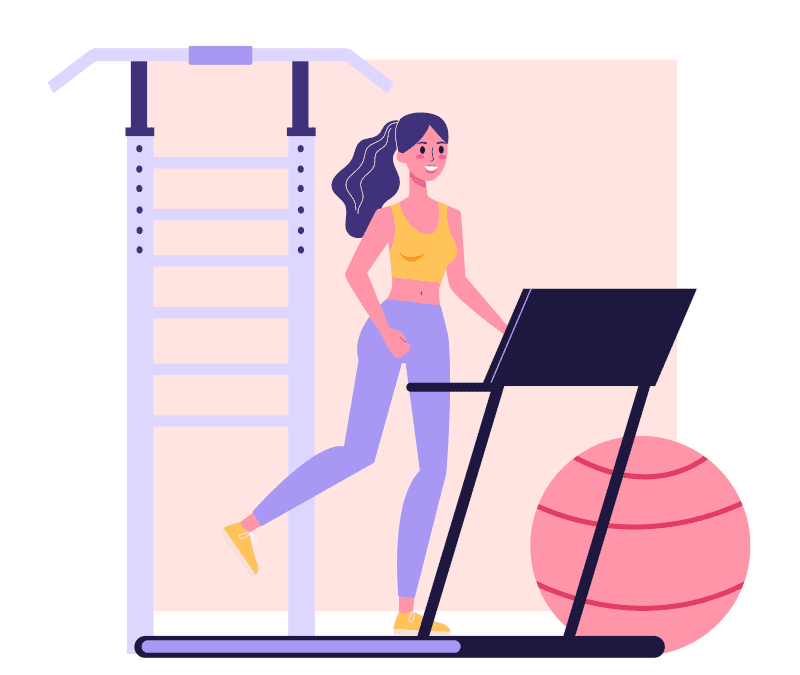For some people, exercise is an invigorating and inspiring experience. Pushing yourself to run farther, to lift a little more, or to add a little speed to your tennis serve—any and all kinds of exercise can provide the thrill of seeing improvement and reaching goals through ongoing hard work. Folks who feel like this about exercise may not enjoy every minute of every workout, but they probably enjoy the ways in which regular exercise can improve their physical—and even their—mental health.
Exercise Benefits for Physical and Mental Health
For other people, however, exercise is nothing but awful. Running hurts. Lifting hurts. And the tennis serve? Well, it’s just embarrassing. There are so many other ways to spend time that involve less pain, less embarrassment, and less sweating. Hey, surviving gym class as a child offered enough physical activity to last the exercise-averse population a lifetime.
But here’s the thing: those physical and mental health benefits we mentioned above? Those are real. And while those benefits are important for everyone, they are absolutely critical for a person in recovery. Good physical and mental health can make a relapse less likely. Not only that but better physical and mental health can just make every day more enjoyable.
If you fall into the second camp—the group of folks who rather do anything than exercise—we encourage you to read on. Heck, reading this blog lets you put off any thoughts about a workout, right?
Breaking Down the Benefits of Exercise for Those in Recovery
As anyone in recovery for a substance use disorder knows, each day presents a range of challenges that might threaten your sobriety if you don’t have good strategies in place for coping with them. Exercise can be one of those strategies—and a particularly effective one at that. Here’s why:
- Exercise can strengthen your immune system. This can be very important for a person in recovery because the immune system can be damaged by misuse of alcohol or drugs.
- Exercise can boost your energy—and your mood. It might seem counterintuitive that exercise, which you may associate with being exhausted from effort, can make you feel more energetic, but it can. And at the same time, it can boost your overall mood. This combination of energy and good feelings can keep depression and anxiety at bay while helping you get through the day in a positive way.
- Exercise can lead to more restful sleep. Getting enough rest is also important to maintaining your sobriety, and exercise during the day can lead to better sleep at night.
- Exercise can help you battle boredom—and cravings. People in recovery are often advised to avoid letting themselves become bored for extended periods, in part because that boredom can lead to more intense cravings for drugs or alcohol. Exercise is a great alternative to sitting around doing nothing.
- Exercise can lessen chronic pain. Painkillers can be a problem for a person in recovery, so finding alternative ways to lessen ongoing pain is key. Regular exercise can help control chronic pain without the aid of any drugs.
Still with us? Starting to see the ways in which exercise might be helpful to you? We hope so. But you might still be convinced that the overall awfulness of exercise outweighs any of these potential benefits.
We beg to differ.
The Goals Can Be Small and the Activities Can Be Fun
Often, when we think of exercise, we think of the kinds of people who show up in commercials for gyms and home exercise equipment. You know the people we mean: shockingly attractive individuals who are clearly already in great shape.
If you use these fitness models as the standard you need to reach, it is easy to conclude that doing nothing is as good as doing something. After all, you’re not going to reach that goal anyway, so why go through the pain of exercising in the first place?
But here’s the thing. Those people in the ads? Looking like them isn’t the goal. The goal, remember, is to boost your physical and mental health. You don’t have to get yourself into the kind of shape that can land you on the cover of a fitness magazine.
Small, incremental changes can make a huge difference when it comes to exercise. And you don’t need special equipment or a gym membership to get started. In fact, you could make a significant change in your overall well-being if you can just commit to a daily walk. And you can start small:
- Could you park a little farther away from the front door at work?
- Could you take the stairs instead of the elevator to the second floor—or even the third?
- Could you fit in a ten-minute walk over your lunch hour?
- Could you work your way up to a 15-minute walk? How about a 15-minute walk twice a day?
- Could you slowly but surely pick up the pace of your daily walks until you are getting 30 minutes of moderate aerobic activity (that is to say, activity that elevates your heart rate) every day?
If you can get from parking a little farther away to 30 minutes of brisk walking a day, you will actually exceed the Department of Health and Human Services’ recommendation for weekly aerobic activity.
We chose walking as a simple example, but any moderate exercise you can do regularly and that you enjoy is a perfect way to get started—and to protect your sobriety.
Exercise the Choice to Get Help for a Substance Use Disorder
If you are struggling with drugs or alcohol, getting enough exercise may be the least of your worries. At French Creek Recovery Center, PA Addiction Rehab, we offer compassionate, personalized treatment that can help you reclaim your sobriety and your life. And then we’ll recommend getting regular exercise.

